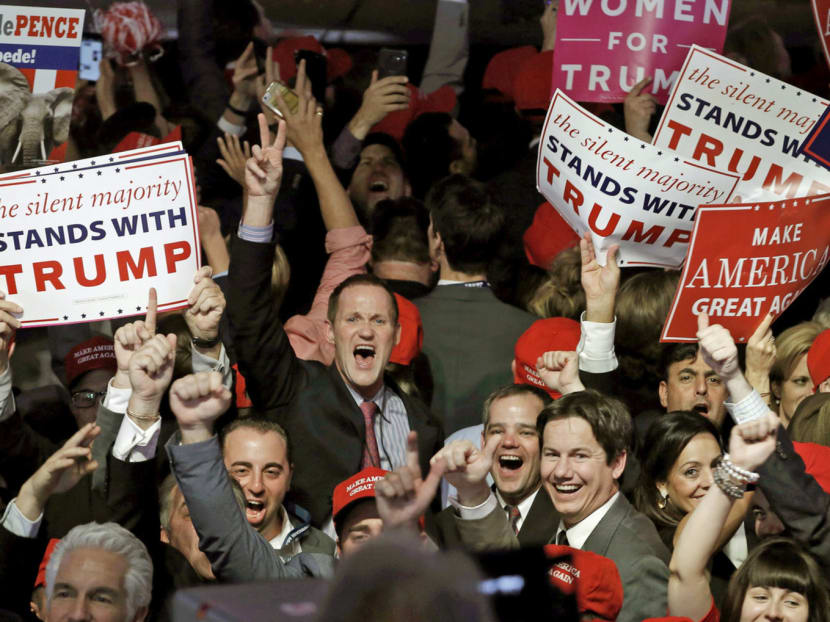Disenchanted working-class whites drove Trump to victory
SINGAPORE — Mr Donald Trump pulled off a stunning upset to clinch the United States presidency by taking a calculated risk and capitalising on the concerns of disenchanted white male voters as well as the silent majority.

Trump supporters celebrating as returns come in for Republican US presidential nominee Donald Trump during an election rally in Manhattan, New York, last night. Photo: Reuters
SINGAPORE — Mr Donald Trump pulled off a stunning upset to clinch the United States presidency by taking a calculated risk and capitalising on the concerns of disenchanted white male voters as well as the silent majority.
His victory was a decisive demonstration of power by a largely overlooked coalition of mostly blue-collar white and working-class voters who felt that the promise of the US had slipped from their grasp amid decades of globalisation and multiculturalism.
“It is not the same America, which East Asia is familiar with, which is confident of its leadership of globalisation. In fact, globalisation is part of the problem because it has winners and losers and the losers felt increasingly alienated from the established order. They expressed themselves when they could through the ballot,” Singapore’s Ambassador-at-Large Bilahari Kausikan told TODAY.
A Reuters/Ipsos Election Day poll found that most Americans who went to the polls were clearly angry with the direction the country was headed. Six out of 10 people said they felt the country is on the wrong track.
Some 58 per cent said “more and more I don’t identify with what America has become” and 75 per cent said “America needs a strong leader to take the country back” from the wealthy.
Democratic contender Mrs Hillary Clinton won the popular vote by a slight margin, but Mr Trump beat her in the Electoral College.
“The biggest factor in Trump’s victory is a manifestly broad feeling among Americans of disillusionment with Washington politics and with both of the major political parties. Most Americans believe the country’s prosperity and security are declining, and that government is not doing its job. Mr Trump tapped into this feeling, the power of which almost all of the pundits underestimated,” Dr Denny Roy, a senior fellow at the East-West Center in Honolulu told TODAY.
More than 80 polls have been conducted since mid-September by 20 major polling institutions including national networks, prominent newspapers and news wires but none understood the depth of voters’ resentment towards Mrs Clinton, a former First Lady, Senator and Secretary of State, whom many saw as a corrupt member of the elite Washington establishment.
“I had no idea how deep the divisions are,” Democratic strategist Paul Begala acknowledged on CNN.
In the year where voters in the US and abroad also showed their antipathy towards the political establishment, the globalised economy, and corporate welfare, Mr Trump guessed correctly he could ride that wave of discontent to the White House.
He appealed to voters unhappy with the hollowing out of the country’s manufacturing sector and fearful of the country’s changing demographics, campaigning on a harsh anti-immigration message.
And Mr Trump promised big things: That he would bring jobs back and punish outsourcing corporations, that he would restore the country to some unspecified early time of prosperity and security — even as unemployment tumbled below 5 per cent.
“He was an imperfect candidate with a near-perfect message,” said Mr Ford O’Connell, a Republican strategist who has long backed Mr Trump. “I don’t think a lot of people understood that.”
He also benefited from an opponent with her own flaws. Mrs Clinton, was continually dragged down by questions over her use of a private email server while she was Secretary of State and the activities of her family foundation, while her corporate-friendly background left some Democrats sceptical and unenthusiastic.
She strained to make a persuasive case for herself as a champion of the economically downtrodden after delivering perfunctory paid speeches that earned her millions of dollars.
Mrs Clinton and her advisers had also taken for granted that states like Michigan and Wisconsin would stick with a Democratic nominee, and that she could repeat US President Barack Obama’s strategy of mobilising the party’s ascendant liberal coalition rather than pursuing a more moderate course like her husband, former president Bill Clinton, did 24 years ago.
But not until these voters were offered a Republican who ran as an unapologetic populist, railing against foreign trade deals and illegal immigration, did they move so drastically away from their ancestral political home.
From Pennsylvania to Wisconsin, industrial towns once full of union voters who for decades offered their votes to Democratic presidential candidates, even in the party’s lean years, shifted to Mr Trump’s Republican Party.
“She is not a good campaigner. She spent too much time talking about her competence and experience and being anti-Trump rather than painting a picture of her vision. She ignored her Democratic base in the mid-Western states and took those states for granted,” Mr Kanti Prasad Bajpai, Wilmar Professor on Asian Studies at the Lee Kuan Yew School of Public Policy told TODAY in an email. AGENCIES









